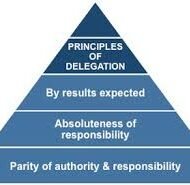Posted by Managementguru in Human Resource, Organisational behaviour, Principles of Management
on Mar 19th, 2014 | 0 comments

You Can Delegate Authority, but Not Responsibility Responsibility of a Manager: A corporate manager is accorded with the huge responsibility of leading his subordinates in the right direction, by giving proper insights on the tasks to be accomplished. The success rate depends on how well he delegates his authority down the line to get things done. The art of delegation results not only in down sizing his work pressure but also in the empowerment of subordinates, that elevates them to a higher plane of understanding and achievement. An Excerpt from The Art of Delegation: Developing This Essential Managerial Skill Delegation helps you handover the authority of certain tasks to capable team members so that you free up your time to work on more pressing issues. But you still remain responsible to get those completed in proper way. Hence it is essential to have a status check or communication with the team member on regular basis. Accountability of Subordinates: The subordinates, when entrusted with the responsibilities of performing a task by themselves and the necessary authority to make decisions within the area of their assigned duties, are obliged to perform. The necessary assistance and training for the new assignment has to be planned for, by the manager to make them perform as per the expected standards. The thing is right people should be chosen for the entrusted job. They should possess the zeal and enthusiasm to deliver the desired output. Some people perform beyond expectations and they should be rewarded with additional responsibilities. Whatever the case may be, it is a wise thing to delegate simple assignments at the initial stage, and proceed with more challenging jobs depending upon the caliber of the incumbent. THE ENTREPRENEUR’S GUIDE TO DELEGATION Clear and Clever Delegation: Clear and clever delegation facilitates to build a formal organization structure, where the subordinates are trained well and they look up to the manager for direction and guidance. Although the authority is delegated, the manager is held accountable and answerable to the management for the performance output or the end result. Some managers hesitate to delegate, just for the reason that their weaknesses might get exposed. Some don’t have confidence in their subordinates. Some even fear that they might lose their power if the subordinate is very shrewd and exceeds the expectations. Managers fail because of poor delegation; the reasons being personal attitude of managers in delegating authority. Let us understand some of the basic principles to be adhered to while delegating: The authority delegated to subordinates should be adequate enough to ensure their ability to accomplish the expected results. Authority can be delegated but responsibility can never be delegated. Responsibility of subordinates is “performance” and that of managers is “responsibility for the action of their subordinates”. One cannot be held responsible for a task if he has only limited authority. There need to be a balance between authority and responsibility. The presence of a single superior will invoke greater feeling of personal responsibility among the subordinates. Lack of receptiveness on the superior’s part will incur greater loss in terms of performance and efficiency. Instead, a manager should develop a trustful attitude towards his subordinates and should have the patience to explain the policies, objectives and guidelines and give sufficient authority to perform a duty. HOW WELL EMPLOYEES KNOW ABOUT YOUR ORGANIZATION? Although initially the efforts taken to train a subordinate is time consuming, the more empowered he becomes, less is your time taken to accomplish the enterprise objectives. The superior must be able to create a climate of mutual trust and goodwill, to make delegations effective in the light of expected...

Posted by Managementguru in Business Management, Human Resource, Organisational behaviour, Principles of Management
on Mar 10th, 2014 | 0 comments

Line and Staff Authority LINE AUTHORITY: It is that authority which a superior exercises over his subordinates to accomplish primary objectives of the organization. The superior issues orders and instructions to his sub ordinates to complete the tasks. This authority is delegated to those positions or elements of the organization which have direct responsibility for accomplishing the primary enterprise objectives. The flow of authority is always in the downward direction from the superior to the subordinate and such relationship is called LINE RELATIONSHIP that exists in all departments of an organization. ROLES OF THE LINE RELATIONSHIP: 1. As a Chain of Command: Line officials are in the chain of command from the highest position to the lowest position in the organization. Each successive manager exercises command over his subordinates. 2. As a career of accountability: Each executive in the line is accountable for the proper performance of the tasks assigned to him and every subordinate is answerable to his superior. 3. As a Channel of communication: Since the line relationship involves issue of instructions from the authorities and reporting from subordinates, it facilitates and serves as an effective channel of communication. Line relationship helps the organization to work properly by Providing the decisions required for functioning Furnishing reference points for the approval of proposals Serving as a means of control by setting the limits of authority Establishing authentic communication channels to make leadership process effective STAFF AUTHORITY: Literally staff implies a stick carried in the hand for support. In the context of management, it implies to those elements that help the line authorities to function effectively in accomplishing the primary objectives of the enterprise. Staff provides advice assistance and information to line managers and they are distinguished into three categories namely, personal, specialized and general staff. They reduce the burden of line authorities and they too have the right to command and extract work from their subordinates. According to Henri Fayol “staff is an adjunct, reinforcement and a sort of extension of line manager’s personality.” LINE AND STAFF CONFLICTS: As always, functional and decisional conflicts arise between line and staff members. The causes may be attributed to the following reasons. 1. Line managers grudge against the staff personnel: a) The staff authorities try to encroach upon the line managers and tell them how to do their work b) Lack of well balanced advice from the staff managers c) Staff managers are not directly accountable and sport a jealous attitude towards line authorities d) Staff managers fail to see the big picture objectively and their interests are confined to specified situations e) Staff often tend to impose their superiority on line managers 2. Staff personnel complaints against the line managers a) Line managers don’t want to listen to the suggestions of the staff and make it a point to resist new ideas. b) Lack of authority on the part of staff managers to implement their innovative ideas and hence the dependence on line authorities. c) Line managers do not utilize the services of staff personnel properly and effectively. 3. The workers’ attitude a) The authority relationships between line and staff specialists are not clearly defined most of the time b) The basic difference in attitude and perception of the line and staff managers create difficulties for the work force in carrying out orders and...




